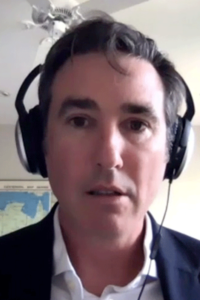
Heart failure is becoming the most common complication of type 2 diabetes, but it’s also an underrecognized complication of the disease and one that requires cooperation from both endocrinologists and cardiologists.
That was the consensus of an expert panel that provided an Update on Heart Failure for the Diabetologist on Friday, June 12, during the Scientific Sessions. The presentation can be viewed by registered meeting attendees at ADA2020.org through September 10, 2020. If you haven’t registered for the Virtual 80th Scientific Sessions, register today to access all of the valuable meeting content.
Endocrinologists, diabetologists, primary care physicians, and internists should focus on heart failure prevention, while cardiologists should focus on managing heart failure in diabetes patients, according to Yehuda Handelsman, MD, FACP, FNLA, FASPC, MACE, Medical Director and Principal Investigator at the Metabolic Institute of America.
“We need to identify early to prevent, and we need to be able to refer on time to the heart failure specialists,” said Dr. Handelsman, an endocrinologist who was joined in the virtual presentation by two cardiologists, Kim A. Connelly, MBBS, PhD, FRACP, and John JV McMurray, OBE, BSc (Hons), MB, ChB (Hons), MD, FRCP, FESC.

“It’s important to realize that heart failure is a clinical syndrome,” said Dr. Connelly, a scientist at Keenan Research Centre for Biomedical Science of St. Michael’s Hospital, and Associate Professor at the University of Toronto, Ontario, Canada.
Dr. Connelly presented a primer on the etiology, diagnosis, and treatment of heart failure. “It’s not a diagnosis in and of itself, and it results from structural or functional impairment of ventricular filling or impairment of the ejection of blood,” he explained.
As many as 1 in 5 people will develop heart failure during their lifetimes, and all diabetes patients are considered at high risk for heart failure, said Dr. Connelly, adding that as A1C increases, so does the risk for heart failure.
“This is a very morbid condition,” he added. “The outcomes are mirrored whether you have diabetes or not, but they are made worse when you have an underlying diagnosis of diabetes.”

Early detection and diagnosis are critical to modifying adverse outcomes. Globally, the five-year survival rate for patients with heart failure is 50%, Dr. Connelly said.
Dr. McMurray, Professor of Cardiology at the University of Glasgow in Scotland, discussed the effects of glucose-lowering medications on the prevention and treatment of heart failure.
“We now have overwhelming evidence—at least five major trials—showing that SGLT2 (sodium-glucose cotransporter 2) inhibitors reduce the risk of developing heart failure in patients with type 2 diabetes,” he said.
The Dapagliflozin and Prevention of Adverse Outcomes in Heart Failure (DAPA-HF) trial has shown these drugs can be used to treat and prevent heart failure with reduced ejection fraction (HFrEF), one of the two major heart failure phenotypes. Meanwhile, trials are underway to evaluate drugs to treat heart failure with preserved ejection fraction (HFpEF).
“These drugs could, in fact, be the first major therapeutic breakthrough in this other major heart failure phenotype,” said Dr. McMurray, noting that “next to nothing” is known about the safety of older glucose-lowering medications or two new classes of drugs, dipeptidyl peptidase 4 (DDP-4) inhibitors and glucagon-like peptide-1 (GLP-1) receptor agonists, in patients with HFrEF or HFpEF.
Dr. McMurray also underscored the importance of prevention.
“Once you develop heart failure, you are in trouble,” he said. “Your quality of life is terrible, symptom burden is huge, and your risk of hospitalization is very high.”
Dr. Handelsman reported that 50% to 80% of people with diabetes die of cardiovascular disease. The fastest-growing diabetes population is people aged 20 to 40, he said, and heart failure starts developing early.
“We have to look at those symptoms and take them seriously with every patient with diabetes,” he said.
Looking to the future, Dr. Handelsman predicted the development of cardiometabolic multidisciplinary centers to manage patients with diabetes and heart failure.
VIEW THIS PRESENTATION
Already registered?
View this presentation at ADA2020.org
Not yet registered?
Register now to access all presentations from the Virtual 80th Scientific Sessions